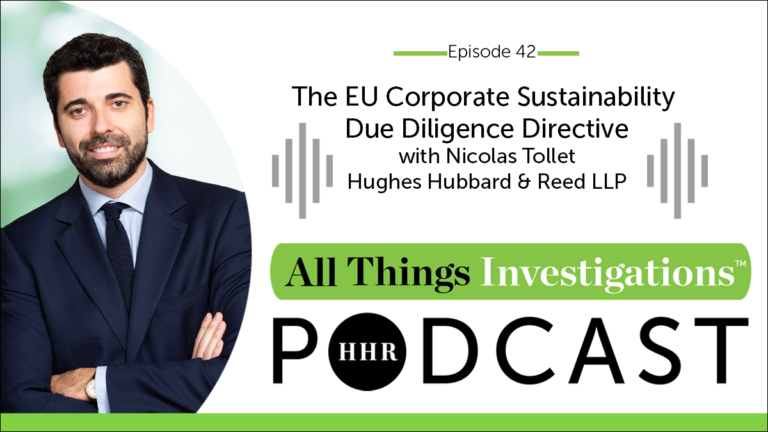This episode of All Things Investigations explores the recent EU Corporate Sustainability Due Diligence Directive that could transform compliance programs and corporate governance globally. Tom Fox and Nicolas Tollet analyze the Directive’s provisions mandating human rights and environmental risk management across company value chains. Nicolas explains how the law builds on France’s pioneering 2017 Duty of Care legislation and its impact on corporate accountability for both EU and non-EU multinationals.
Nicolas Tollet is a Partner at Hughes Hubbard. He previously served as Vice President for Compliance at Technip, an oil and gas service firm. With over 20 years of experience in compliance and internal investigations, he has worked on significant cases like Alcatel, TSKJ, and Lava Jato. Nicolas has expertise in monitorships, having been involved in the first one imposed on a French company by the DOJ and the SEC. He helps companies worldwide with compliance programs, audits, and M&A due diligence.
You’ll hear Tom and Nicolas discuss:
- The new EU Directive on Corporate Sustainability Due Diligence will require companies above certain revenue thresholds to implement human rights and environmental compliance programs, not just for their operations but across their entire value chain.
- France has been at the forefront of such legislation with its 2017 Duty of Care law. The EU directive builds on this, with more expansive requirements and penalties of up to 5% of worldwide turnover for non-compliance.
- The directive explicitly links human rights risks to corruption risks, recognizing their interconnection. It has the potential to drive even broader risk coverage than typical anti-bribery programs.
- By mandating due diligence across the value chain, the directive will necessitate contract terms like audit rights as standard procedure. Financial institutions may also need to evaluate the human rights impacts of clients they fund.
- The directive allows each EU country to determine how to specifically transpose and enforce the law’s obligations. This could lead to a complex web of overlapping inspection regimes applied to multinationals.
- Even companies not based in the EU will fall under the law if they meet certain revenue thresholds in Europe. Non-EU companies should tap French expertise since France is about 6 years ahead in implementing similar mandates.
- Required public sustainability reporting adds another layer reinforcing the need for concrete compliance actions.
- While the US led historically on anti-corruption compliance, the EU is now at the vanguard of expanding into human rights, environment, and sustainability. France in particular has established itself as a leader in advancing corporate compliance expectations.
KEY QUOTES
“There is a direct link within the directive between human rights compliance and anti-corruption compliance, which the compliance community in the world has been seeing for years now.” – Nicolas Tollet
“So we shouldn’t expect one member state to be reluctant to enforce the legislation. The EU will make sure that every member state issue and then enforce the legislation in each country.” – Nicolas Tollet
“Fortunately, we are still linked in how we work in the business field, and we have to take both into account. So there is a certain pride indeed, because there is real expertise in France now on compliance, but it’s mixed between the French and the American compliance community, I would say. So it’s working together that we’ve managed to improve compliance.” – Nicolas Tollet
Resources:
Hughes Hubbard & Reed website
Nicolas Tollet on LinkedIn






